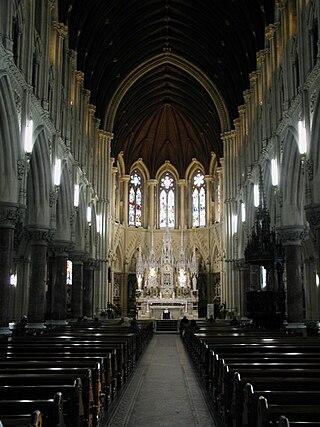Related Research Articles

Lancelot Andrewes was an English bishop and scholar, who held high positions in the Church of England during the reigns of Elizabeth I and James I. During the latter's reign, Andrewes served successively as Bishop of Chichester, of Ely, and of Winchester and oversaw the translation of the King James Version of the Bible. In the Church of England he is commemorated on 25 September with a lesser festival.

Thomas Secker was an Archbishop of Canterbury in the Church of England.

Joseph Butler was an English Anglican bishop, theologian, apologist, and philosopher, born in Wantage in the English county of Berkshire. His principal works are the Fifteen Sermons Preached at the Rolls Chapel (1726) and The Analogy of Religion (1736).

Nicholas Patrick Stephen Wiseman was an English Catholic prelate who served as the first Archbishop of Westminster upon the re-establishment of the Catholic hierarchy in England and Wales in 1850. He was made a cardinal in 1850.

The Douay–Rheims Bible, also known as the Douay–Rheims Version, Rheims–Douai Bible or Douai Bible, and abbreviated as D–R, DRB, and DRV, is a translation of the Bible from the Latin Vulgate into English made by members of the English College, Douai, in the service of the Catholic Church. The New Testament portion was published in Reims, France, in 1582, in one volume with extensive commentary and notes. The Old Testament portion was published in two volumes twenty-seven years later in 1609 and 1610 by the University of Douai. The first volume, covering Genesis to Job, was published in 1609; the second, covering the Book of Psalms to 2 Maccabees plus the three apocryphal books of the Vulgate appendix following the Old Testament, was published in 1610. Marginal notes took up the bulk of the volumes and offered insights on issues of translation, and on the Hebrew and Greek source texts of the Vulgate.

William Magee was an Irish academic and Church of Ireland clergyman. He taught at Trinity College Dublin, serving as Erasmus Smith's Professor of Mathematics (1800–1811), was Bishop of Raphoe (1819–1822) and then Archbishop of Dublin until his death.
George Downame, otherwise known as George Downham, was an author of influential philosophical and religious works who served as Bishop of Derry during the early years of the Plantation of Ulster. He is said to have been a chaplain to both Elizabeth I and James I.

John MacHale was the Irish Roman Catholic Archbishop of Tuam, and Irish nationalist.

Philip Boyce, OCD, was Bishop of Raphoe from 1 October 1995 until 2017.
Events from the year 1736 in Ireland.
Thomas Haydock (1772–1859) was an English Catholic schoolmaster and publisher born to one of the oldest Recusant families. His dedication to making religious books available to fellow Catholics suffering under the English Penal Laws came at great personal cost.
Bishop John O'Brien (1701–1769) was an Irish bishop of the Roman Catholic Diocese Cork and Cloyne. He was also appointed as the vicar general of Cork, Cloyne and Ross. He is best remembered as the author of one of the earliest Irish-English dictionaries.
James Thomas O'Brien (1792–1874), was an Irish clergyman. He was Church of Ireland Bishop of Ossory, Ferns and Leighlin from 1842 to 1874.

Joseph Ferguson Peacocke was a Church of Ireland cleric. He was the Bishop of Meath from 1894 to 1897 and then Archbishop of Dublin from 1897 until 1915. He was also briefly the professor of pastoral theology at Trinity College, Dublin.
Nicholas Bernard was an Anglican priest and author during the 17th century. A dean in Ireland at the time of the Rebellion of 1641, he wrote descriptions of current events. He was also the biographer of James Ussher.
Henry Leslie was a Scotsman who became the Church of Ireland Bishop of Down and Connor from 1635 to 1661 and briefly Bishop of Meath from January to April 1661.

Joseph Stock (1740–1813) was an Irish Protestant churchman and writer, bishop of Killala and Achonry and afterwards bishop of Waterford and Lismore.

Robert Clayton (1695–1758) was an Irish Protestant bishop, now known for his Essay on Spirit. In his own lifetime, he was notorious for his unorthodox beliefs, which led his critics to question whether he could properly be called a Christian at all, and at the time of his death, he was facing charges of heresy.
James Dillon (1738–1806) was an Irish Roman Catholic Bishop of Kilmore from 1800 to 1806.

The Diocese of Cloyne is a Latin diocese of the Catholic Church in Ireland. It is one of six suffragan dioceses in the ecclesiastical province of Cashel.
References
![]() This article incorporates text from a publication now in the public domain : "Gallagher, James". Dictionary of National Biography . London: Smith, Elder & Co. 1885–1900.
This article incorporates text from a publication now in the public domain : "Gallagher, James". Dictionary of National Biography . London: Smith, Elder & Co. 1885–1900.